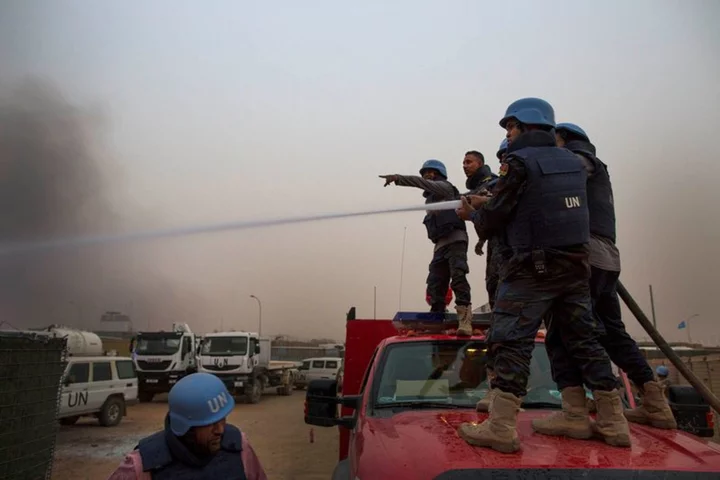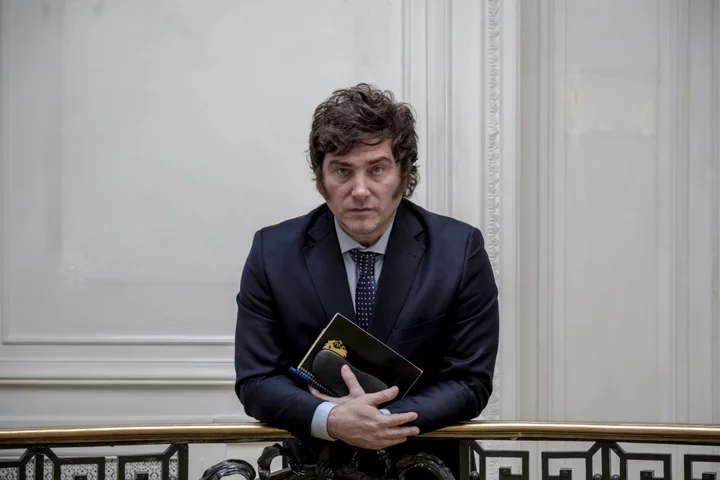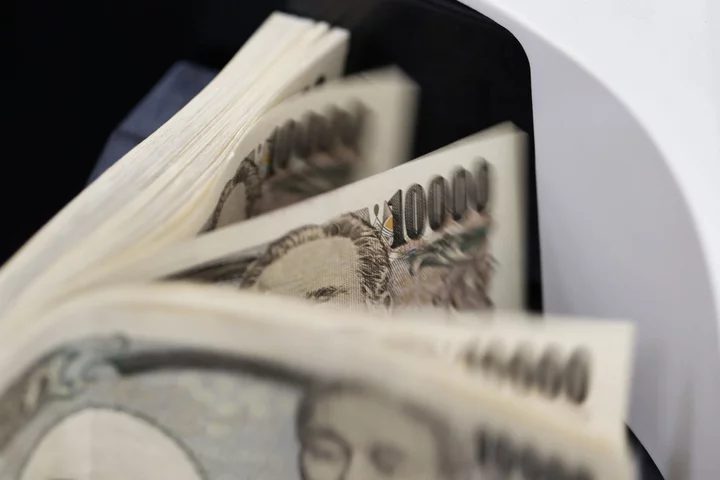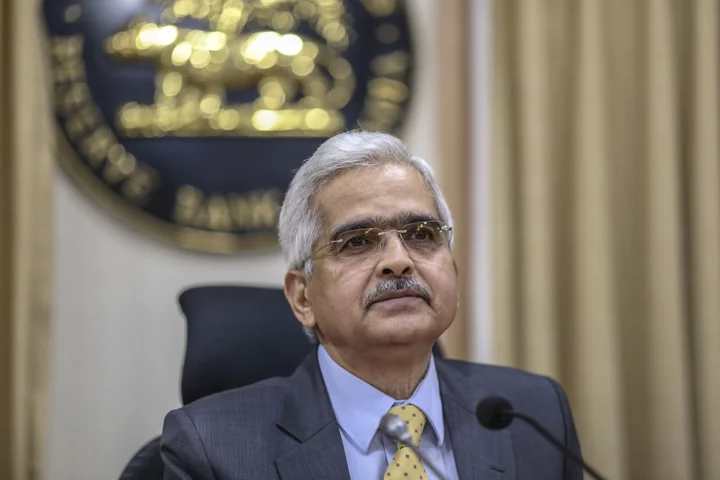By Edward McAllister and David Lewis
DAKAR/NAIROBI Mali's unexpected demand for the departure of U.N. peacekeepers may herald a sudden end to a decade-long mission that has struggled to protect civilians and its own troops, raising fears the country could slide deeper into chaos amid an Islamist insurgency and the possible revival of a separatist uprising.
The U.N. mission, known as MINUSMA, has been hobbled by restrictions on its air and ground operations since Mali's ruling junta joined forces with Russian military contractor Wagner Group in 2021, limiting its effectiveness against an Islamist insurgency that took root a decade ago and has since spread across West Africa.
Despite the restrictions, MINUSMA's 13,000-strong force has held the line in northern cities including Gao and Timbuktu that are surrounded by militants. It patrols camps for displaced people, which come under frequent attack, and provides medical evacuations for Mali's under-equipped army.
And it has also helped to placate Tuareg-led rebels in northern Mali, who halted their separatist uprising with the 2015 Algiers Accord.
It is unclear how quickly U.N. troops could leave following Mali's request on Friday. But, if and when they do, Bamako will be alone with about 1,000 Wagner soldiers to battle the militants linked to Islamic State and al Qaeda, who have killed thousands of civilians and soldiers and control large swathes of the country's desert north and centre.
"If you leave, you have anarchy and civil war, especially against civilians and the weak," Ahmedou Ould-Abdallah, a former Mauritanian foreign minister who served as a top U.N. official in West Africa and now runs a regional think-tank, said on Friday. "If you stay, you are almost discredited."
A spokesman for the Coordination of Azawad Movements (CMA), the Tuareg-led northern rebel alliance, said a UN withdrawal would be premature because the peace deal had not been fully implemented and would threaten stability across the Sahel. He said, however, the CMA had not yet reached an official position.
Relations between the U.N. and Mali's junta, which consolidated power in two coups in 2020 and 2021, have frayed for years. Bamako wanted MINUSMA to become a more active fighting force to counter the Islamist threat, which the U.N. said was not part of its mission. U.N. officials, meanwhile, pushed for greater freedoms to protect civilians and investigate rights abuses by militants, the army and, more recently, Wagner.
Ties reached breaking point last month when U.N investigators released a report accusing the army and "armed white men" of massacring 500 people in the town of Moura in March 2022. Mali, Russia and Wagner deny wrongdoing in Moura or targeting civilians anywhere in Mali.
The U.N. has repeatedly said that the constraints imposed by the junta have stopped it from fulfilling its mission. Mali frequently denied or delayed permission for MINUSMA to move in combat zones, it said, making it less able to respond to civilians under attack or swiftly probe abuses.
Mali's government and army did not respond to requests for comment.
Frustrated by the restrictions, Western and African diplomats called for change this year. However, following a review of the mission in January, U.N. Secretary General Antonio Guterres last week rejected a proposal for a surge of up to 3,600 more troops, which Mali's African neighbours had pushed for, as well as an alternative proposal that would have shrunk MINUSMA to a political mission in Bamako.
Instead, he proposed extending the mandate for the force with only a few tweaks, including closing some small northern bases.
On June 14, the Malian government issued a statement rejecting all the proposals. Then on Friday, Malian Foreign Minister Abdoulaye Diop told a U.N. security council meeting that there had been "a crisis of confidence between Malian authorities and MINUSMA" and the force should leave "right away".
The 15-member U.N. Security Council was scheduled to renew MINUSMA's mandate before it expires on June 30. Reuters could not immediately determine whether the council - where Russia has a veto as one of the 5 permanent members - will now vote for a renewal, or how long it would take to conclude an orderly withdrawal of the mission if there was no extension.
On Friday, in response to Mali's announcement, MINUSMA's head El-Ghassim Wane told reporters that peacekeepers can only operate with consent from the host country: without that, the mission is "impossible," he said.
MINUSMA spokesperson Fatoumata Sinkoun Kaba declined to comment on the logistics of any withdrawal and said the mission would follow Security Council mandates.
RESTRICTIONS
MINUSMA launched in 2013 after the separatist rebels and al Qaeda-linked insurgents occupied northern Mali. French troops forced the militants to retreat but they bounced back. More than 170 peacekeepers have died in fighting, making MINUSMA the U.N.'s deadliest combat mission.
Violence has spread into neighbouring Burkina Faso and Niger, creating one of the world's fastest-growing humanitarian crises.
Mali's junta promised stability when it snatched power; it took an anti-French stance and deepened ties with Russia. By the end of 2021, Wagner had deployed.
Within weeks, Mali imposed the flight restrictions. Reuters was unable to determine whether the move was linked to Wagner’s presence. It mirrors past U.N. flight restrictions in Central African Republic, where Wagner also operates.
Bamako and the Kremlin say Russian troops, not Wagner mercenaries, are present in Mali but only to train the army and supply equipment.
Mali's army spokesman, Colonel Souleymane Dembelé, told Reuters this year that restrictions on MINUSMA were retaliation for a no-fly zone imposed by French forces last year. Paris denies this.
By mid-2022, restrictions prevented the U.N. from operating unscheduled flights over 70,000 square kilometres of Mali, according to an internal U.N. report from the middle of last year reviewed by Reuters. Nearly 500 U.N. flight requests - one in four - have been denied this year, according to Security Council figures.
"MINUSMA is another peacekeeping lame duck. The mission couldn't fulfil the expectations of the population," said Ulf Laessing, head of the Sahel programme at the Konrad Adenauer foundation.
Frustrated, countries including the United Kingdom, Germany and Sweden, which provided some of the best trained soldiers, have announced troop withdrawals amounting to more than 20 percent of the mission. France, which had a separate task force in Mali, withdrew its remaining 2,400 troops in 2022, including the air support it gave the U.N.
The majority of MINUSMA's remaining soldiers are supplied by African nations.
Three of four units of MINUSMA's elite mobile task force are not operational, the Security Council said in a March 30 report. In July, Egypt suspended its MINUSMA activities because of attacks on its troops. For nearly a year, its 1,072 soldiers have been stuck in base.
A document prepared in April by the U.N. Department of Peace Operations detailed a string of units - from armed helicopters and airfield support to infantry and intelligence - that MINUSMA lacked.
HEART AND MINDS
MINUSMA still plays a significant role in Mali. Its $1 billion budget has created thousands of jobs and provided local support by erecting streets lights or police stations in a country whose economy has been crippled by coup-related sanctions imposed by its neighbours.
It helped organise a constitutional referendum on Sunday meant to pave the way to presidential elections next year.
Crucially, it has coordinated peace talks between rival armed groups in the north, the U.N. and security officials said.
A senior U.N. official, who asked not to be identified because of the sensitivity of the situation, said Tuareg leaders had indicated that the withdrawal of the UN mission could lead to the collapse of the Algiers Accord, which marked the official end of a four-year armed uprising that seized large parts of northern Mali - with repercussions felt across the region.
Ould Mohamed Ramdane, spokesperson for CMA rebel alliance, said that in addition to its role in ongoing talks, MINUSMA had brought "calm and security" to areas where it was deployed and had dispensed a lot of humanitarian aid in northern Mali.
"We all think that its withdrawal will have a major impact on the northern localities but also on stability throughout the Sahel," Ramdane said.
"The threat of resumption of violence with the former separatists is looming again," said Yvan Guichaoua, senior lecturer at the Brussels school of international studies, referring to the fallout from MINUSMA’s expected departure. In addition to the loss of its security forces, the withdrawal of U.N. investigative teams would increase the risk of impunity for human rights abuses during the conflict, he said.
Attacks on civilians surged in the year after Wagner arrived. At least 750 were killed during joint operations carried out by Wagner and Mali's military during that period, according to data from the Armed Conflict Location & Event Data Project, a U.S.-based research group. Sixty civilians died in military operations in the year before Wagner came.
Restrictions in MINUSMA's movements have meant the mission has become more and more focused in recent years on protecting itself. A U.S. official, who asked not to be identified because of the sensitivity of the situation, said 90% of troop operations are focused on securing its own bases and defending peacekeepers.
As a result, MINUSMA has struggled to counter a tide of anti-U.N. posts online, losing the battle for public opinion in Mali. In a recent survey of nearly 2,300 Malians conducted by German political foundation Friedrich-Ebert-Stiftung, 72% blamed MINUSMA for not protecting civilians.
Over 90% said they had confidence in Russia to support Mali in the fight against Islamists.
(Reporting by Edward McAllister in Dakar and David Lewis in Nairobi; Additional reporting by Tiemoko Diallo in Bamako; Editing by Daniel Flynn)









